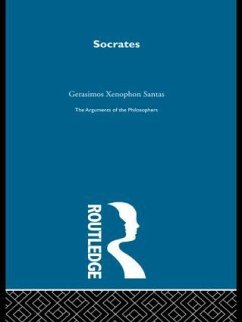Santas
Socrates-Arg Philosophers
Santas
Socrates-Arg Philosophers
- Broschiertes Buch
- Merkliste
- Auf die Merkliste
- Bewerten Bewerten
- Teilen
- Produkt teilen
- Produkterinnerung
- Produkterinnerung
First Published in 1999. Routledge is an imprint of Taylor & Francis, an informa company.
Andere Kunden interessierten sich auch für
![Hume-Arg Philosophers Hume-Arg Philosophers]() Barry StroudHume-Arg Philosophers56,99 €
Barry StroudHume-Arg Philosophers56,99 €![Butler-Arg Philosophers Butler-Arg Philosophers]() PenelhumButler-Arg Philosophers74,99 €
PenelhumButler-Arg Philosophers74,99 €![Russell - Arg Philosophers Russell - Arg Philosophers]() R.M. SainsburyRussell - Arg Philosophers74,99 €
R.M. SainsburyRussell - Arg Philosophers74,99 €![Santayana-Arg Philosophers Santayana-Arg Philosophers]() Santayana-Arg Philosophers63,99 €
Santayana-Arg Philosophers63,99 €![Peirce-Arg Philosophers Peirce-Arg Philosophers]() HookwayPeirce-Arg Philosophers74,99 €
HookwayPeirce-Arg Philosophers74,99 €![Frege - Arg Philosophers (RPD) Frege - Arg Philosophers (RPD)]() H. SlugaFrege - Arg Philosophers (RPD)63,99 €
H. SlugaFrege - Arg Philosophers (RPD)63,99 €![Marx Arg Philosophers Marx Arg Philosophers]() A. WoodMarx Arg Philosophers63,99 €
A. WoodMarx Arg Philosophers63,99 €-
-
-
First Published in 1999. Routledge is an imprint of Taylor & Francis, an informa company.
Hinweis: Dieser Artikel kann nur an eine deutsche Lieferadresse ausgeliefert werden.
Hinweis: Dieser Artikel kann nur an eine deutsche Lieferadresse ausgeliefert werden.
Produktdetails
- Produktdetails
- Verlag: Routledge
- Seitenzahl: 360
- Erscheinungstermin: 10. Oktober 2008
- Englisch
- Abmessung: 234mm x 156mm x 19mm
- Gewicht: 547g
- ISBN-13: 9780415487603
- ISBN-10: 0415487609
- Artikelnr.: 26685640
- Herstellerkennzeichnung
- Libri GmbH
- Europaallee 1
- 36244 Bad Hersfeld
- gpsr@libri.de
- Verlag: Routledge
- Seitenzahl: 360
- Erscheinungstermin: 10. Oktober 2008
- Englisch
- Abmessung: 234mm x 156mm x 19mm
- Gewicht: 547g
- ISBN-13: 9780415487603
- ISBN-10: 0415487609
- Artikelnr.: 26685640
- Herstellerkennzeichnung
- Libri GmbH
- Europaallee 1
- 36244 Bad Hersfeld
- gpsr@libri.de
Gerasimos Xenophon Santas
Part One THE PHILOSOPHER AND THE CITIZEN I Introduction to Plato's Socrates
II Socrates and the Laws of Athens 1 Socrates' arguments in the Crito that
he ought not to escape from jail 2 Socrates' views in the Apology about the
citizen, his city, and its laws 3 Is there any inconsistency between the
Apology and the Crito? Part Two SOCRATIC METHOD III Socratic Questions and
Assumptions 1 A sample of Socrates' questions 2 Questions about Socratic
questions 3 The pragmatics of Socrates' questionings 4 The syntactics of
Socrates' questions 5 The semantics of Socrates' questions IV Socratic
Definitions 1 A list of all the definitions in the Socratic Dialogues 2 The
syntax and forms of Socratic definitions 3 The semantics of Socratic
definitions 4 The pragmatics of Socratic definitions 5 Criteria for
adequate Socratic definitions V Socratic Arguments 1 Variety of arguments 2
Method of analyzing arguments 3 Inductive analogies: from the
arts-crafts-sciences to ethics 4 Inductive generalizations: from the
arts-crafts-sciences to ethics 5 Deductive arguments: two indirect
arguments from the Lysis 6 Deductive arguments: a direct argument from the
Lysis 7 Deductive arguments: a direct argument from the Protagoras Part
Three SOCRATIC ETHICS VI Virtue and Knowledge I: The Socratic Paradoxes 1
The distinction between the prudential and the moral paradox 2 The
prudential paradox 3 The moral paradox VII Virtue and Knowledge II: An
Argument against Explanations of Weakness 1 The context and the strategy 2
The argument 3 Application of the argument to other cases 4 The strength
model 5 Weakness and compulsion VIII Power, Virtue, Pleasure, and Happiness
in the Gorgias 1 The issues of vittue and happiness 2 Socrates' arguments
that the unjust man is unhappy 3 Goods and evils and happiness and
unhappiness: Socrates and Polus 4 Callicles' view of virtue, pleasure, and
happiness 5 Socrates' attack on Callicles' view: the arguments against
justice by nature, and against hedonism 6 Virtue as health of the soul and
justice as medicine
II Socrates and the Laws of Athens 1 Socrates' arguments in the Crito that
he ought not to escape from jail 2 Socrates' views in the Apology about the
citizen, his city, and its laws 3 Is there any inconsistency between the
Apology and the Crito? Part Two SOCRATIC METHOD III Socratic Questions and
Assumptions 1 A sample of Socrates' questions 2 Questions about Socratic
questions 3 The pragmatics of Socrates' questionings 4 The syntactics of
Socrates' questions 5 The semantics of Socrates' questions IV Socratic
Definitions 1 A list of all the definitions in the Socratic Dialogues 2 The
syntax and forms of Socratic definitions 3 The semantics of Socratic
definitions 4 The pragmatics of Socratic definitions 5 Criteria for
adequate Socratic definitions V Socratic Arguments 1 Variety of arguments 2
Method of analyzing arguments 3 Inductive analogies: from the
arts-crafts-sciences to ethics 4 Inductive generalizations: from the
arts-crafts-sciences to ethics 5 Deductive arguments: two indirect
arguments from the Lysis 6 Deductive arguments: a direct argument from the
Lysis 7 Deductive arguments: a direct argument from the Protagoras Part
Three SOCRATIC ETHICS VI Virtue and Knowledge I: The Socratic Paradoxes 1
The distinction between the prudential and the moral paradox 2 The
prudential paradox 3 The moral paradox VII Virtue and Knowledge II: An
Argument against Explanations of Weakness 1 The context and the strategy 2
The argument 3 Application of the argument to other cases 4 The strength
model 5 Weakness and compulsion VIII Power, Virtue, Pleasure, and Happiness
in the Gorgias 1 The issues of vittue and happiness 2 Socrates' arguments
that the unjust man is unhappy 3 Goods and evils and happiness and
unhappiness: Socrates and Polus 4 Callicles' view of virtue, pleasure, and
happiness 5 Socrates' attack on Callicles' view: the arguments against
justice by nature, and against hedonism 6 Virtue as health of the soul and
justice as medicine
Part One THE PHILOSOPHER AND THE CITIZEN I Introduction to Plato's Socrates
II Socrates and the Laws of Athens 1 Socrates' arguments in the Crito that
he ought not to escape from jail 2 Socrates' views in the Apology about the
citizen, his city, and its laws 3 Is there any inconsistency between the
Apology and the Crito? Part Two SOCRATIC METHOD III Socratic Questions and
Assumptions 1 A sample of Socrates' questions 2 Questions about Socratic
questions 3 The pragmatics of Socrates' questionings 4 The syntactics of
Socrates' questions 5 The semantics of Socrates' questions IV Socratic
Definitions 1 A list of all the definitions in the Socratic Dialogues 2 The
syntax and forms of Socratic definitions 3 The semantics of Socratic
definitions 4 The pragmatics of Socratic definitions 5 Criteria for
adequate Socratic definitions V Socratic Arguments 1 Variety of arguments 2
Method of analyzing arguments 3 Inductive analogies: from the
arts-crafts-sciences to ethics 4 Inductive generalizations: from the
arts-crafts-sciences to ethics 5 Deductive arguments: two indirect
arguments from the Lysis 6 Deductive arguments: a direct argument from the
Lysis 7 Deductive arguments: a direct argument from the Protagoras Part
Three SOCRATIC ETHICS VI Virtue and Knowledge I: The Socratic Paradoxes 1
The distinction between the prudential and the moral paradox 2 The
prudential paradox 3 The moral paradox VII Virtue and Knowledge II: An
Argument against Explanations of Weakness 1 The context and the strategy 2
The argument 3 Application of the argument to other cases 4 The strength
model 5 Weakness and compulsion VIII Power, Virtue, Pleasure, and Happiness
in the Gorgias 1 The issues of vittue and happiness 2 Socrates' arguments
that the unjust man is unhappy 3 Goods and evils and happiness and
unhappiness: Socrates and Polus 4 Callicles' view of virtue, pleasure, and
happiness 5 Socrates' attack on Callicles' view: the arguments against
justice by nature, and against hedonism 6 Virtue as health of the soul and
justice as medicine
II Socrates and the Laws of Athens 1 Socrates' arguments in the Crito that
he ought not to escape from jail 2 Socrates' views in the Apology about the
citizen, his city, and its laws 3 Is there any inconsistency between the
Apology and the Crito? Part Two SOCRATIC METHOD III Socratic Questions and
Assumptions 1 A sample of Socrates' questions 2 Questions about Socratic
questions 3 The pragmatics of Socrates' questionings 4 The syntactics of
Socrates' questions 5 The semantics of Socrates' questions IV Socratic
Definitions 1 A list of all the definitions in the Socratic Dialogues 2 The
syntax and forms of Socratic definitions 3 The semantics of Socratic
definitions 4 The pragmatics of Socratic definitions 5 Criteria for
adequate Socratic definitions V Socratic Arguments 1 Variety of arguments 2
Method of analyzing arguments 3 Inductive analogies: from the
arts-crafts-sciences to ethics 4 Inductive generalizations: from the
arts-crafts-sciences to ethics 5 Deductive arguments: two indirect
arguments from the Lysis 6 Deductive arguments: a direct argument from the
Lysis 7 Deductive arguments: a direct argument from the Protagoras Part
Three SOCRATIC ETHICS VI Virtue and Knowledge I: The Socratic Paradoxes 1
The distinction between the prudential and the moral paradox 2 The
prudential paradox 3 The moral paradox VII Virtue and Knowledge II: An
Argument against Explanations of Weakness 1 The context and the strategy 2
The argument 3 Application of the argument to other cases 4 The strength
model 5 Weakness and compulsion VIII Power, Virtue, Pleasure, and Happiness
in the Gorgias 1 The issues of vittue and happiness 2 Socrates' arguments
that the unjust man is unhappy 3 Goods and evils and happiness and
unhappiness: Socrates and Polus 4 Callicles' view of virtue, pleasure, and
happiness 5 Socrates' attack on Callicles' view: the arguments against
justice by nature, and against hedonism 6 Virtue as health of the soul and
justice as medicine








